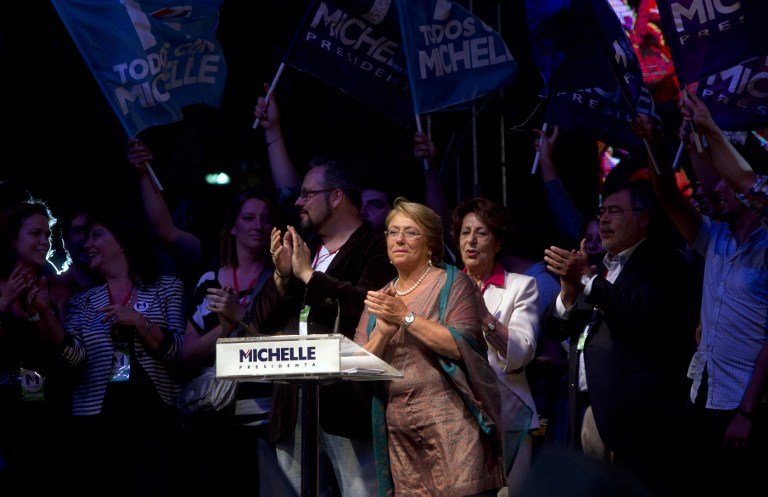SUMMARY
This is AI generated summarization, which may have errors. For context, always refer to the full article.

SANTIAGO, Chile – Socialist Michelle Bachelet was swept back into office Sunday, December 15, as Chile’s next president, on a platform of narrowing the gap between rich and poor.
“Chile, now, finally, the time has come to carry out the changes,” Bachelet told cheering supporters in Santiago shortly after her landslide win, joined by her children and mother Angela Jeria.
Bachelet, 62, takes office March 11 to succeed conservative billionaire President Sebastian Piñera for a term running through 2018.
She served as Chile’s first woman president in 2006, leaving a lot undone which most Chilean want: mainly dismantling more of the political and social legacy of the Pinochet era.
“It is clear at this point. She won. And we congratulate her. Later on, I will go speak with her personally,” conservative rival Evelyn Matthei told reporters.
The national electoral board said Bachelet earned 62.40% of the vote against Matthei’s 37.50%, with 81.05% of votes tallied.
Bachelet’s contest with Matthei marked the first time in Latin America that a presidential runoff was held between two women.
More than 13 million Chileans were eligible to vote Sunday, but this year’s race marked the first time that voting in a presidential election was voluntary in Chile. Early indications were that turnout was low.
In the first round, which resulted with Bachelet winning 47% of the vote to 25% for Matthei, more than 50% of voters did not bother to cast ballots.
Matthei, 60, and Bachelet are both the daughters of Air Force generals and knew each other as schoolgirls.
But while Bachelet’s father died after being tortured for remaining loyal to leftist president Salvador Allende in the 1973 coup, Matthei’s father supported the 1973-1990 dictatorship of Augusto Pinochet.
Bachelet was also tortured, fled the country, then returned years later to work as a pediatrician, eventually entering politics.
Plenty at stake for a new Bachelet term
Bachelet focused her campaign on promises of greater social justice in a country that has the highest per capita income of any Latin American country.
She has proposed increasing taxes to raise $8.2 billion for the state coffers and also wants to provide universally free access to post-secondary education.
Bachelet also hopes to carry out sweeping reforms that include overhauling Chile’s constitution, a legacy of the Pinochet era.
Bachelet plans to bring Chile in line with a wave of social liberalism sweeping once-conservative Latin America, including by legalizing abortion and opening discussions on same-sex marriage.
In her first term, Bachelet reformed the pension system, improved health and social services, and focused on the well-being of Chile’s working class and elderly.
Her presidency coincided with a boom in global demand for copper, Chile’s top export.
Matthei, facing what looked like impossible odds, tried to stress improving the lives of Chile’s middle class.
She has slammed Bachelet’s leftist ideas as “experiments that have failed in other countries.” – Rappler.com
Add a comment
How does this make you feel?
There are no comments yet. Add your comment to start the conversation.